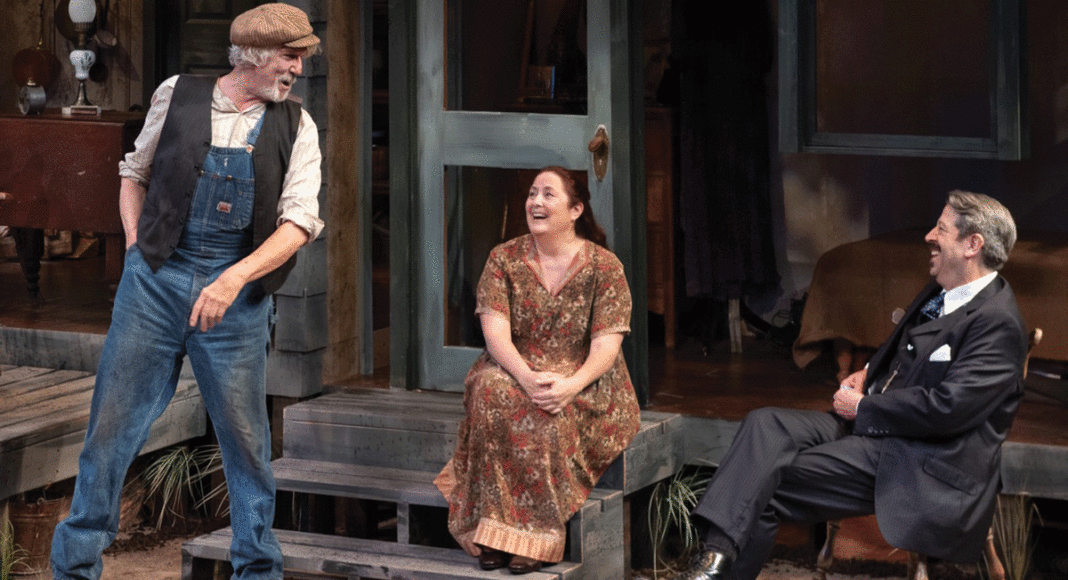Opening the Jewel Theater’s 15th season, Eugene O’Neill’s challenging A Moon for the Misbegotten takes its audience for a turbulent ride through the deep-seated desires of three flamboyant characters.
In this, his final play, the Nobel laureate returned to the autobiographical family haunted by lies, regrets and alcohol he sketched vividly in Long Day’s Journey Into Night. O’Neill’s work is so embedded in American culture that even though today’s audiences rarely see his plays, they know the titles as vivid metaphors for family troubles on an epic scale.
And that’s just what A Moon for the Misbegotten delivers, thanks to O’Neill’s unflinching dialogue and the visceral interactions between tenant farmer Phil Hogan (Howard Swain) and his sharp-tongued daughter Josie (Diana Torres Koss), as they enter into a delusional pact to trick their Connecticut landlord James Tyrone (Rolf Saxon), who’s returned to the countryside to settle his mother’s estate.
An effective farmhouse set—kudos to scenic and lighting designer Kent Dorsey—serves as the central hearth around which the characters will warm their needs, anger and self-deceptive recollections. This play is a marathon of frisky dialogue, hence a feast for actors. Everything occurs in a single evening, one in which moonlight offers the excuse for romantic dalliance between Josie and Tyrone, the man she’s always fancied. They are the play’s “misbegotten” figures—a large, unlovely yokel, and a hopeless alcoholic. Koss uses her physical power and vocal ingenuity to create a convincing portrait of the town’s reputed trollop. Her Josie is strong, clever and tough. The relentless fighting between the father and daughter quickly leads to the hatching of a wild plan to keep their rented land. Broad Irish accents of the father and daughter are written into the play, and however disconcerting they are at the onset, it pays off for the audience to ride out the vocal work until it settles down.
Through a complex negotiation of lies and blarney, Josie and epic boozer Tyrone agree to a midnight date. The evening under the moon is to be a romantic tryst between the rough young woman and a man in deep existential drift, drinking his way to oblivion with only a few stops left before the end. He wants it to be a “night different than any other” with Josie. What he means by that is misinterpreted by each character, but results in the unnerving plot twist designed to give the play a redemptive close.
Without spoiling the ending, let’s just say that no one’s story is what we believe it to be. This is Eugene O’Neill, not Walt Disney. And the playwright is hell-bent on taking the viewer into dark basements of buried memories and destroyed dreams. As James Tyrone tells Josie, “there is no present or future—only the past, happening over and over again—now.”
To make all this Sophoclean psychodrama work, the actors must construct characters whose joys and sorrows the audience can embrace. The play’s structural problems can be overcome only if we care enough to squint at plot weaknesses and dated dialogue.
The opening night performance stood squarely on the confident performance of Koss, who convinced us of Josie’s vulnerability embedded within haughty self-sufficiency, the equal of any man in the poor Connecticut landscape where she works as farmhand, cook, foreman, and housekeeper to her bad-tempered drunken father.
More chemistry is needed between Koss and Saxon in order for the long night of moonlight confessions to approach full conviction. Their timing can be tuned as the performances develop. Everything in the compelling last half-hour depends on our believing that alcohol has permeated James Tyrone’s heart, soul and voice. Yet somehow, the urban suit and the moustache muffled his character’s bourbon-soaked agony.
This ambitious play asks much of its players and much of the audience. Opening night’s crowd was on board, and gave the players a well-earned ovation. Full of moonshine, sly social criticism and some brooding, poetic lines, A Moon for the Misbegotten reveals an underbelly of American class conflict, as well as personal angst still echoing through today’s social fabric—a well-turned lesson in theater history.
‘A Moon for the Misbegotten’ by Eugene O’Neill runs through Sept. 29 at the Colligan Theater.














